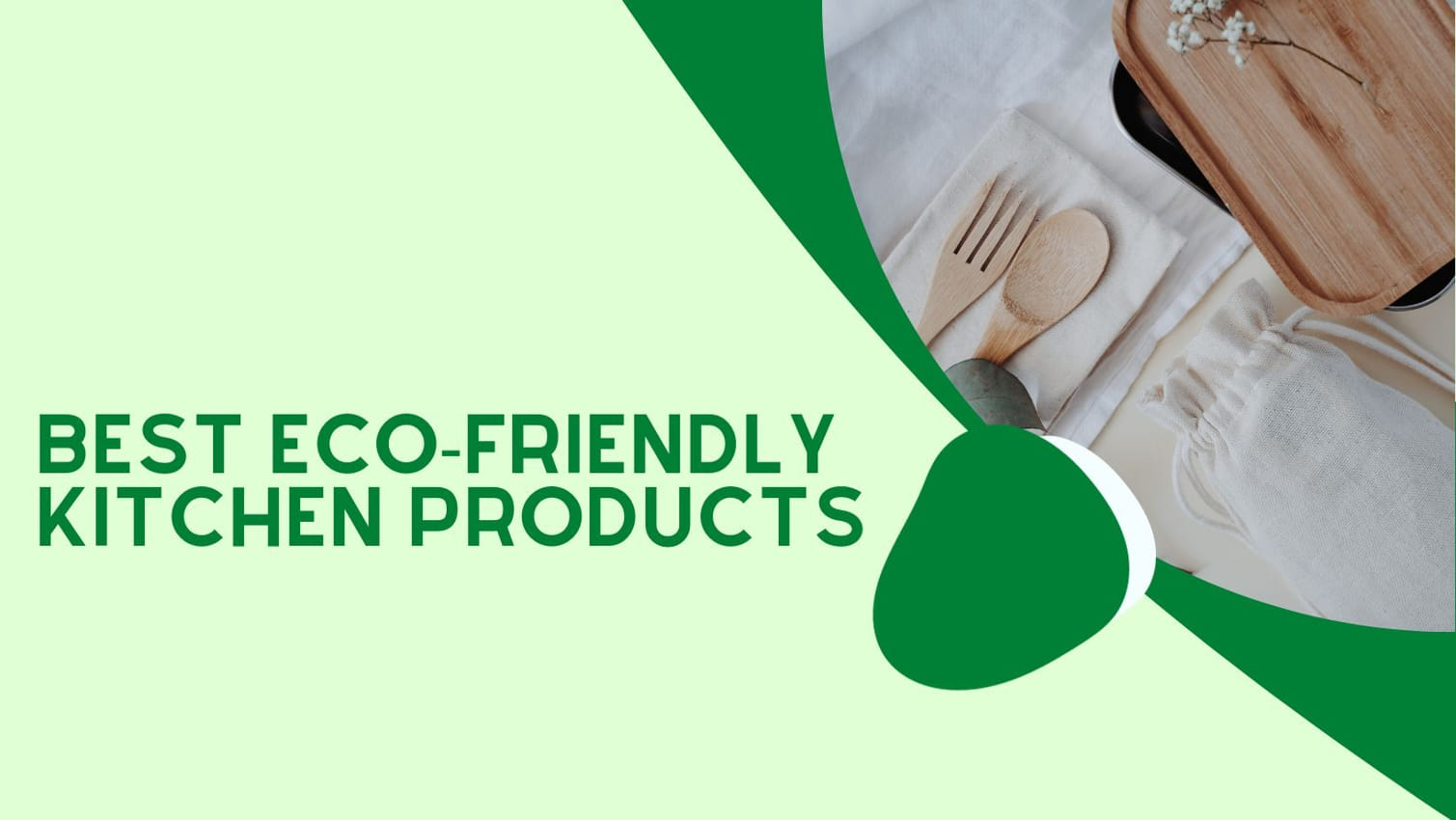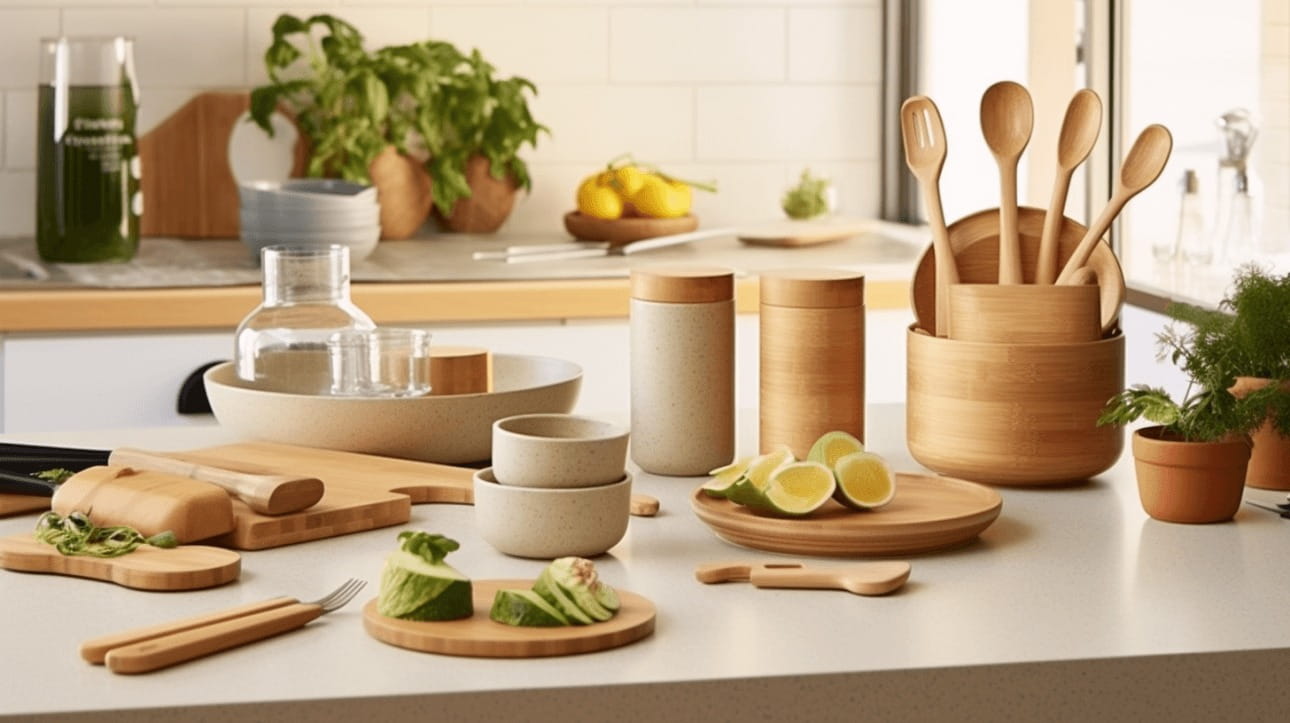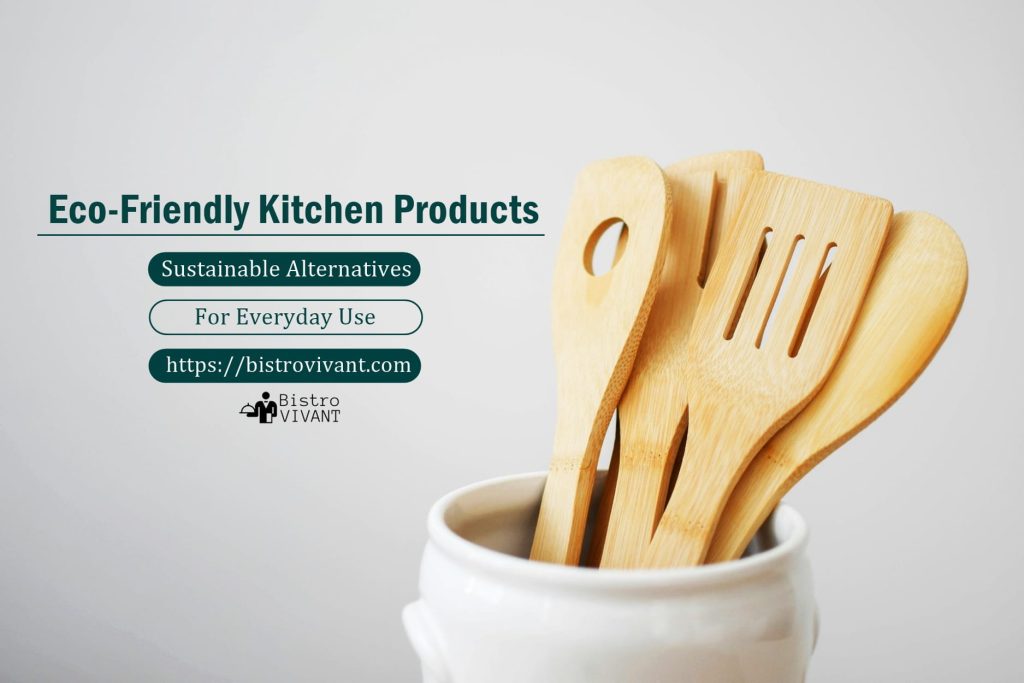Overwhelmed by the impact of single-use plastics and harmful chemicals in your kitchen? Make a sustainable change today by incorporating eco-friendly kitchen products into your daily routine. Swap out plastic with reusable beeswax wraps. Choose biodegradable dish brushes for an eco-friendly touch. These alternatives are not just green—they’re also stylish and effective. Embrace a green lifestyle with simple changes. Make a big difference by reducing waste and promoting earth-friendly practices in your home.
Key Takeaways:
- Eco-Friendly Kitchen Products Can Help Reduce Waste: By opting for sustainable alternatives like reusable food storage containers, stainless steel straws, and silicone food wraps, we can cut down on single-use plastics and minimize our environmental impact.
- Choosing sustainable kitchen products promotes a greener lifestyle. Investing in environmentally friendly kitchen supplies, such as bamboo utensils, beeswax food wraps, and compostable dish scrubbers, not only reduces our carbon footprint but also supports the growth of a more sustainable economy.
- Small Changes in the Kitchen Can Make a Big Difference: Swapping out traditional kitchen items for sustainable alternatives may seem small, but collectively, these changes can have a significant positive impact on the environment and contribute to a more eco-conscious way of living.
The Importance of Eco-Friendly Kitchen Products

While Eco-Friendly Kitchen Products | Zero Waste provide a sustainable choice for your cooking and dining needs, it’s important to understand the significance of incorporating eco-friendly practices into your daily kitchen routines. Not only do environmentally friendly kitchen supplies contribute to a healthier planet, but they also promote a more sustainable lifestyle for you and future generations to come.
The Impact of Traditional Kitchen Products on the Environment
Kitchen products that are not environmentally friendly, such as single-use plastics, non-recyclable materials, and products made with harsh chemicals, have a detrimental impact on the environment. Plastic utensils and containers, for example, contribute to pollution in oceans and landfills, harming wildlife and ecosystems. Additionally, the production and disposal of these products contribute to carbon emissions, further exacerbating climate change.
The Benefits of Switching to Sustainable Alternatives
On the other hand, opting for sustainable kitchen products has a multitude of benefits. By choosing reusable items made from biodegradable materials or recycled content, you can significantly reduce your carbon footprint. Not only are these products better for the environment, but they are also safer for your health as they are free from harmful chemicals often found in traditional kitchen items.
Sustainable alternatives also promote a more mindful consumption pattern, encouraging you to make more conscious choices in your daily life. By making the switch to environmentally friendly kitchen supplies, you are taking a proactive step towards preserving our planet for future generations.
Sustainable Materials for Kitchen Products
Bamboo: A Renewable Resource for Kitchen Utensils
Kitchen products made from bamboo are not only stylish but also environmentally friendly. Bamboo is a fast-growing grass that reaches maturity in just a few years, making it one of the most sustainable materials available for kitchen utensils. By choosing bamboo utensils, you are opting for a renewable resource that helps reduce deforestation and minimizes environmental impact.
Recycled Materials: Giving Old Products a New Life
Materials such as recycled glass, plastic, and metal offer a second life to discarded items, reducing waste and energy consumption in the production of new kitchen products. By incorporating recycled materials into your kitchenware, you are actively contributing to the conservation of resources and the reduction of landfill waste.
Plus, choosing kitchen products made from recycled materials can add a unique touch to your culinary space, as each piece often carries its own history and character.
Bioplastics: A Greener Alternative to Traditional Plastics
An increasing number of kitchen products are now being made from bioplastics, a type of plastic derived from renewable biomass sources such as cornstarch, sugarcane, or even algae. These biodegradable materials offer a more sustainable alternative to traditional plastics, reducing the dependence on fossil fuels and cutting down on greenhouse gas emissions. When you opt for , you are making a conscious choice to support eco-friendly practices and help protect the planet for future generations.
Sustainable living begins with the choices you make in your everyday life. By selecting kitchen products made from sustainable materials such as bamboo, recycled materials, or bioplastics, you are not only reducing your environmental footprint but also setting an example for others to follow. Making small changes in your kitchen can have a big impact on the planet, so choose wisely and embrace a more eco-friendly lifestyle.
Eco-Friendly Kitchen Essentials
For Sustainable Products For A More Eco-Friendly Kitchen, incorporating eco-friendly kitchen imperatives can have a significant impact on reducing waste and promoting sustainability in your daily routines. Here are some imperative items that can help you transition to a more sustainable kitchen:

Reusable Beeswax Wraps: A Replacement for Plastic Wrap
Plastic wrap is a kitchen imperative many of us use without a second thought, but its single-use nature contributes to environmental harm. By swapping plastic wrap for reusable beeswax wraps, you can eliminate unnecessary waste. These wraps are made from cotton infused with beeswax, tree resin, and jojoba oil, creating a natural and sustainable alternative for wrapping food and covering containers. They are washable and can be reused multiple times, making them a versatile and eco-friendly addition to your kitchen imperatives.
Stainless Steel Water Bottles: Reducing Single-Use Plastics
Kitchen imperatives like single-use plastic water bottles are incredibly damaging to the environment, contributing to pollution and plastic waste. By switching to stainless steel water bottles, you can significantly reduce your plastic consumption. These durable and reusable bottles are perfect for carrying water on the go, whether you’re at work, the gym, or running errands. They are easy to clean, free from harmful chemicals like BPA, and can help you play a vital role in minimizing single-use plastics in your daily life.
For instance, by investing in a stainless steel water bottle, you can prevent countless plastic bottles from ending up in landfills or oceans. Additionally, these bottles are designed to last for years, reducing the need to constantly purchase single-use plastic alternatives.
Silicone Baking Mats: A Non-Stick Alternative to Paper
Non-stick silicone baking mats are a sustainable alternative to disposable parchment paper or aluminum foil. These mats are made from food-grade silicone and can be reused for baking your favorite treats, eliminating the need for single-use paper products. They are non-toxic, easy to clean, and can withstand high temperatures, making them a versatile addition to your eco-friendly kitchen arsenal.
Another benefit of silicone baking mats is their cost-effectiveness in the long run. Instead of repeatedly buying parchment paper or aluminum foil, a one-time investment in these durable mats can save you money and reduce your environmental footprint.
Eco-Safe Kitchen Accessories: Sustainable Alternatives for Everyday Use
The Benefits of Composting Food Waste
Now, with growing concerns about environmental sustainability, composting food waste has become increasingly popular. Composting not only reduces the amount of waste that goes to landfills, but it also creates nutrient-rich compost that can be used to enrich soil in gardens, helping your plants thrive. By composting your food scraps, you are contributing to a healthier environment and reducing greenhouse gas emissions that come from decomposing organic matter in landfills.
Creative Ways to Repurpose Kitchen Scraps
Finding creative ways to repurpose kitchen scraps offers several benefits. It minimizes waste and saves money on additional ingredients. By using vegetable peels, fruit skins, and leftover herbs, you make the most of your resources and cut down on environmental impact.
Repurposing scraps also sparks creativity in the kitchen. It can lead to new flavors and recipes. Citrus peels, coffee grounds, and herb stems, for example, can be used to make homemade cleaners, natural dyes, and flavorful broths.
Get inventive with your food scraps. Explore different ways to turn them into useful items for your home and cooking.
Reducing Food Packaging Waste with Bulk Shopping
Food packaging waste can be significantly reduced by opting for bulk shopping for items such as grains, nuts, and spices. Buying in bulk not only allows you to purchase the precise amount you need, minimizing food waste, but it also reduces the amount of packaging that ends up in landfills. You can bring your reusable containers to the store and fill them with the exact quantities of ingredients you need, eliminating single-use packaging and promoting a more sustainable way of shopping.
Ways to practice bulk shopping include visiting local zero-waste stores, food cooperatives, or bulk sections in grocery stores, where you can scoop out items and use reusable bags or containers to store your purchases. Embracing bulk shopping not only helps reduce food packaging waste but also encourages mindful consumption and sustainable living practices.

Energy-Efficient Kitchen Appliances
Energy-Star Rated Refrigerators: Saving Energy and Money
Money is always on your mind, and choosing energy-efficient appliances can help you save both energy and money in the long run. Energy-Star-rated refrigerators are designed to consume less energy while still keeping your food fresh and chilled. These refrigerators use advanced technologies like improved insulation and compressor systems. They reduce energy consumption and help cut your electricity bills.
Induction Cooking: A Faster and Greener Alternative
An exciting option for eco-friendly cooking is induction cooking. This method uses electromagnetic energy to directly heat pots and pans rather than the surrounding air, making it faster and more energy-efficient. Induction cooktops are known to heat up quicker than traditional gas or electric stoves, saving you time and energy. Additionally, because the heat is localized to the cookware, less heat is wasted, resulting in a more energy-efficient cooking experience.
Cooking with induction not only reduces your carbon footprint but also makes your kitchen a safer place. Since induction cooktops heat the cookware directly, the surface of the cooktop remains cool to the touch, reducing the risk of burns and making it a safer option for households with children.
Solar-Powered Kitchen Gadgets: Harnessing Renewable Energy
EnergyStar appliances significantly contribute to a sustainable kitchen. Solar-powered kitchen gadgets, like solar ovens, harness the sun’s power to cook food. These gadgets are eco-friendly and cost-effective, using renewable energy to cut down on electricity from non-renewable sources.
The sun’s energy is abundant and free, making it a sustainable choice for kitchen appliances. By using solar-powered gadgets in your daily cooking, you reduce your carbon footprint and support a greener planet, all while benefiting from renewable energy.
DIY Eco-Friendly Kitchen Hacks
Despite the convenience of paper towels, they contribute to significant waste. If you are looking for sustainable alternatives, you can explore 8 Eco-Friendly Paper Towel Alternatives to Try. These alternatives can help you reduce your environmental impact and incorporate eco-friendly practices into your daily routine.
Upcycling Old Kitchen Items into Planters and Decor
Planters are a great way to add greenery to your kitchen while upcycling old items. You can repurpose tin cans, mason jars, or old wooden crates to create unique planters for herbs or small plants. Not only does this reduce waste, but it also adds a touch of charm to your kitchen decor.
Making Your Own Natural Cleaning Products
With simple ingredients like vinegar, baking soda, and essential oils, you can create effective cleaning products. These natural alternatives are safe for your family and the environment. They eliminate the need for harsh chemicals in conventional cleaners. Reduce your exposure to toxins while keeping your kitchen clean and fresh.
Use a mixture of vinegar and water to clean countertops and appliances. Baking soda works well for scrubbing sinks and cutting through grease. Essential oils like tea tree or lavender can be added for their antimicrobial properties and pleasant scent.
Creating a Zero-Waste Kitchen with Repurposed Materials
Use repurposed materials like glass jars for storage. Switch to cloth napkins instead of disposable paper ones. Replace plastic cling film with beeswax wraps. These simple swaps can cut down kitchen waste. Plus, you’ll help the planet stay healthier.
Conclusion
Reflecting on the benefits of sustainable kitchen items reveals how small changes can significantly impact the environment. Choosing sustainable alternatives like reusable food containers, beeswax wraps, and bamboo utensils reduces waste and supports eco-conscious companies.
Remember, every effort counts toward a more sustainable future. When you need kitchen products, consider opting for environmentally friendly options that align with your values. These choices contribute to the well-being of the planet. Together, we can make a difference, one eco-friendly choice at a time.

FAQ
Q1: Why should I consider using eco-friendly kitchen products?
Ans: Using eco-friendly kitchen products helps reduce environmental impact by minimizing waste, conserving resources, and promoting sustainability for future generations.
Q2: What are some sustainable alternatives for everyday kitchen use?
Ans: Sustainable alternatives include using biodegradable cleaning products, reusable food storage containers, bamboo utensils, and silicone food wraps instead of plastic.
Q3: How can I reduce single-use plastic in my kitchen?
Ans: Reduce single-use plastic by making simple switches. Use reusable shopping bags. Choose stainless steel straws over plastic. Store food in glass containers. Preserve it with beeswax wraps instead of cling film.
Q4: Are there eco-friendly options for kitchen cleaning products?
Ans: Vinegar, baking soda, and castile soap are eco-friendly options. They clean surfaces, dishes, and appliances effectively. Harsh chemicals? Not needed. These natural products protect the environment while getting the job done.
Q5: What are some tips for creating an eco-friendly kitchen?
Ans: To create an eco-friendly kitchen, reduce waste. Conserve energy and water. Choose sustainable materials. Support brands that prioritize environmental responsibility.
 https://bistrovivant.com is a participant in the Amazon Services LLC Associates Program, an affiliate advertising program designed to provide a means for website owners to earn advertising fees by advertising and linking to Amazon (.com,.co.uk,.ca, etc.) and any other website that may be affiliated with the Amazon Service LLC Associates Program. As an Amazon Associate, I earn from qualifying purchases.
https://bistrovivant.com is a participant in the Amazon Services LLC Associates Program, an affiliate advertising program designed to provide a means for website owners to earn advertising fees by advertising and linking to Amazon (.com,.co.uk,.ca, etc.) and any other website that may be affiliated with the Amazon Service LLC Associates Program. As an Amazon Associate, I earn from qualifying purchases.

